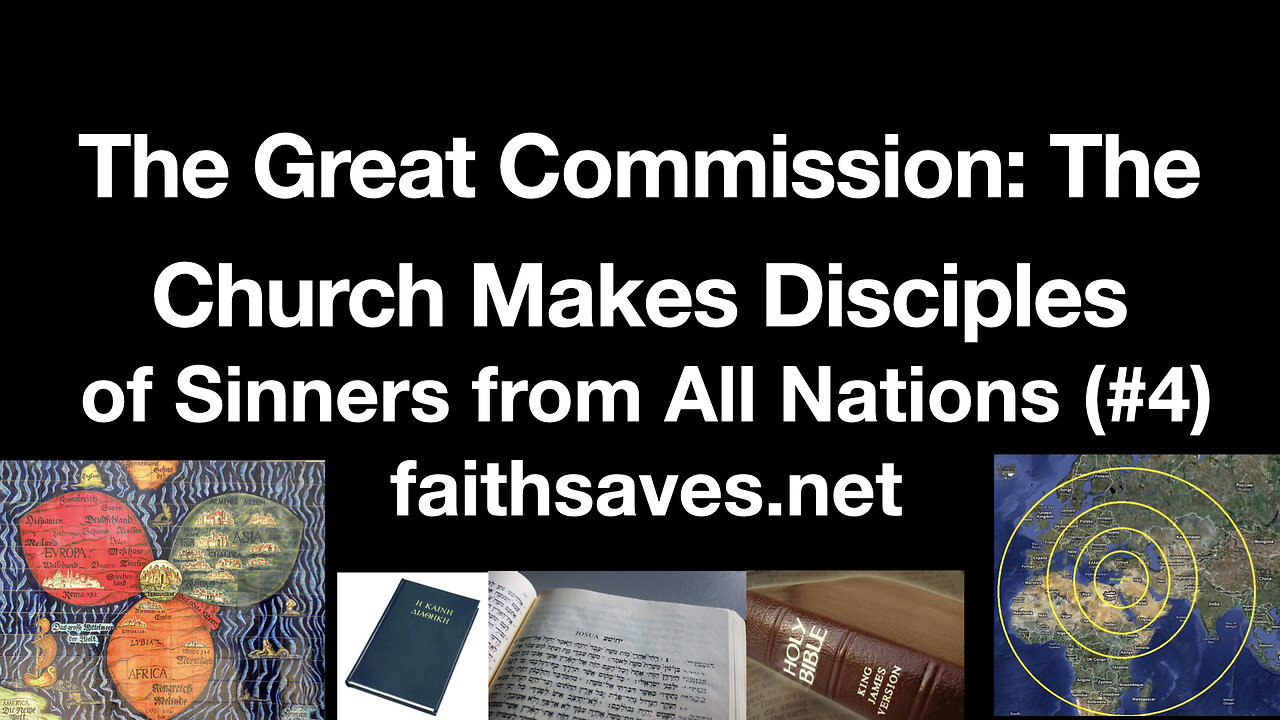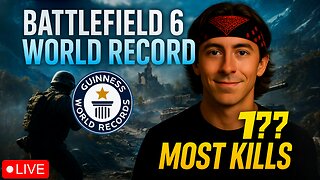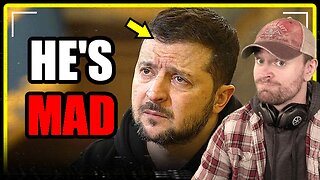Premium Only Content

The Great Commission of the Church: Go, Make Disciples of all Nations, Baptize & Teach Matt 28, (#4)
"The Great Commission of the Church: Go, Make Disciples of All Nations, Baptize and Teach Them to Observe All Things Whatsoever Christ Commanded" is part 1 of a 3 part series on the Great Commission passages (Matthew 28; Mark 16: Luke 24; John 20). Much of the material is found in the study "The Great Commission in Scripture and History" at the FaithSaves website.
Matthew chapter twenty-eight provides the fullest record of the Great Commission:
16 Then the eleven disciples went away into Galilee, into a mountain where Jesus had appointed them. 17 And when they saw him, they worshipped him: but some doubted. 18 And Jesus came and spake unto them, saying, All power is given unto me in heaven and in earth. 19 Go ye therefore, and teach all nations, baptizing them in the name of the Father, and of the Son, and of the Holy Ghost: 20 Teaching them to observe all things whatsoever I have commanded you: and, lo, I am with you alway, even unto the end of the world. Amen. (Matthew 28:16-20)
Not the Apostles only, but others were present at the giving of this Commission (Matthew 28:7, 10). Indeed, this is quite possibly the event referred to in 1 Corinthians 15:6, where the Lord appeared to over 500 brethren at once:
After that, he was seen of above five hundred brethren at once; of whom the greater part remain unto this present, but some are fallen asleep.
When they saw Christ, they “worshipped” Him (Matthew 28:17). The gathered church offered Christ the reverence, the submission, the adoration that is appropriate to He who equally possesses the undivided Divine nature with the Father, and validated His claims to be one Being with the Father by His resurrection from the dead. The Lord Jesus has always been infinitely worthy of honor as the eternal God, and is worthy of the highest honor as exalted Man, carrying human nature in His resurrected, glorified body to the very right hand of the Father, a pledge of the resurrected, ascended glory that He will also give to His people when He divides a portion with the great, and the spoil with the strong (Isaiah 53:12).
The "some" who "doubted" (Matthew 28:17) were some of the other 500 brethren who had assembled, those who had not already seen Christ after His resurrection. The verb appears in Matthew 14:31 for "little faith." The “doubt” of Matthew 28:17 is not a lack of faith or a hostile rebellion against the truth, but it was “little faith,” as with Peter who had enough faith to get out of the boat to walk on the water but not enough to keep his eyes on Christ while walking. As with other resurrection appearances, when at the Lord’s first appearances some thought they saw a spirit or who knows what, but Christ took the doubts away, so here the Lord Jesus Christ took their doubts away as after they first “saw” Him, perhaps far off, He then proceeded to came near them: “He came and spoke to them” (28:18). Talking familiarly with them, all their doubts were taken away.
The Lord tells them, first, “all power is given unto me in heaven and in earth.” As God the Son, the Lord Jesus always had all power, all authority, all right to rule. As the God-Man and our Mediator and Savior, He was now “given” all power. He was legally entitled to it—it was His purchased right. He had humbled Himself, even to the death of the cross, and God now exalted Him, as Philippians 2:5-11 affirms. He also was given all power, not solely for His personal exaltation as the resurrected God-Man, but in persuance of His work of salvation (John 17:2).
It was important for His church to know that He would be with them and that He had all power in heaven and in earth because of what Christ had said would happen the last time He gave His church authority and sent His disciples out (Matthew 10)-serious persecution, opposition, and hostility from the world is what they should expect.
The Lord gave one imperative, the “teach” of Matthew 28:19, with which were associated three participles, “Go” (28:19), “baptizing” (28:19), and “teaching” in 28:20. The “teach” of 28:19 is matheteusate, an aorist active imperative from matheteuo, a verb derived from the common New Testament word, mathetes, “a disciple”— the verb signifies “to make disciples.” Going is a circumstance associated with making disciples; How do you make disciples? You have to go. “Go and make disciples.” “Baptizing” and “teaching” in 28:20 are means through which making disciples is taking place. They explain how the disciple making process occurs. Disciples are baptized and then are continually taught to observe all things whatsoever Christ commands.
In other words, going, baptizing, and teaching all things were constituent parts of this over-arching command to make disciples. What is the main command, the actual thrust, what resurrected Lord commands His church to do? It is not to manipulate people into saying the "sinner's prayer." It is to make disciples. It is to make people who are learners, followers, servants of Jesus Christ.
-
 29:39
29:39
Afshin Rattansi's Going Underground
20 hours agoProf. Jeffrey Sachs: Will The Trump-Putin Meeting End the Ukraine Proxy War and Avert Nuclear War?
9.62K37 -
 9:48:25
9:48:25
Rallied
13 hours ago $18.27 earnedWarzone Solo Challenges All Day w/ Ral
95.4K6 -
![Aug Day #10 of RCP 🤟 [FR/ENG] 🫶 Some Fortnite then Demos then continue on StarRupture 🫶 🤟](https://1a-1791.com/video/fww1/81/s8/1/O/0/c/-/O0c-y.0kob-small-Aug-Day-10-of-RCP-FRENG-Som.jpg) 4:24:45
4:24:45
Deaf Gamer Girl
11 hours agoAug Day #10 of RCP 🤟 [FR/ENG] 🫶 Some Fortnite then Demos then continue on StarRupture 🫶 🤟
48K2 -
 6:59:09
6:59:09
Reidboyy
15 hours ago $11.55 earnedBattlefield 6 #1 POV (Watch and Learn)
91.8K3 -
 2:25:42
2:25:42
TheSaltyCracker
10 hours agoThey So Mad ReEEeStream 8-10-25
124K282 -
 2:27:39
2:27:39
vivafrei
19 hours agoEp. 276: Epstein Subpoenas &Trump E.O! Bondi Offers Reward for Maduro Arrest? MADNESS IN CANADA!
145K138 -
 2:23:55
2:23:55
Barry Cunningham
13 hours agoPRESIDENT TRUMP IS NOT PLAYING AROUND...AND THE LIBNUTS CAN'T STOP HIM!
100K64 -
 22:02
22:02
Stephen Gardner
19 hours ago🔥JUST IN: Trump BETRAYAL plot EXPOSED!
121K308 -
 38:32
38:32
The Why Files
21 days agoThe Real CIA Vol. 1: 693 Pages of Secret Crimes
133K61 -
 49:12
49:12
MattMorseTV
16 hours ago $22.72 earned🔴Zelenskyy is NOT HAPPY about Trump’s NEW DEAL.🔴
128K158